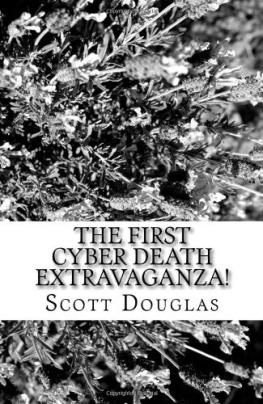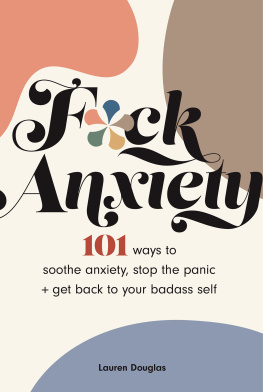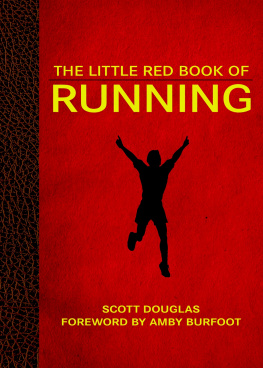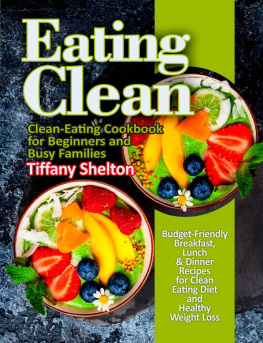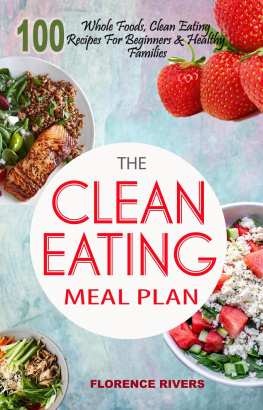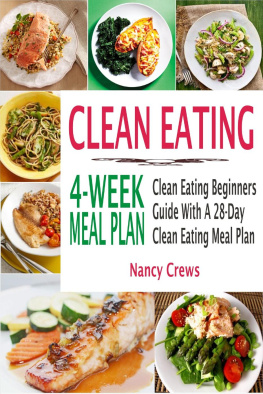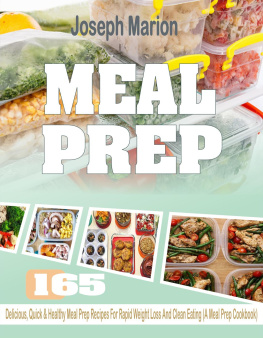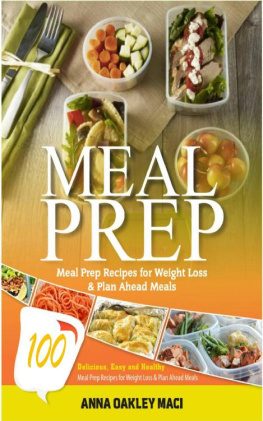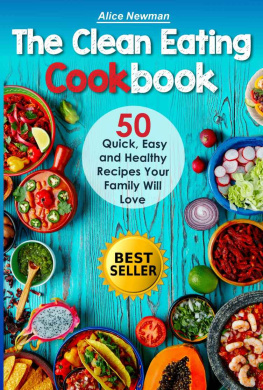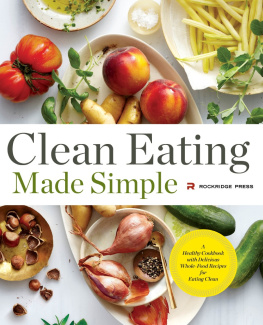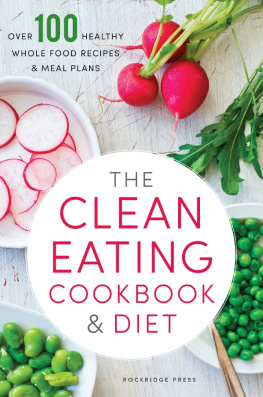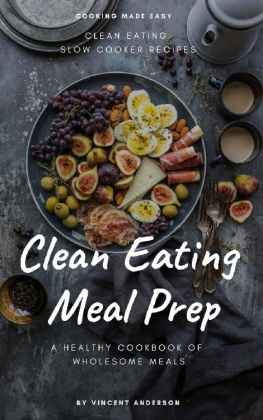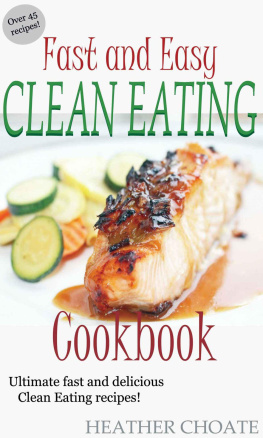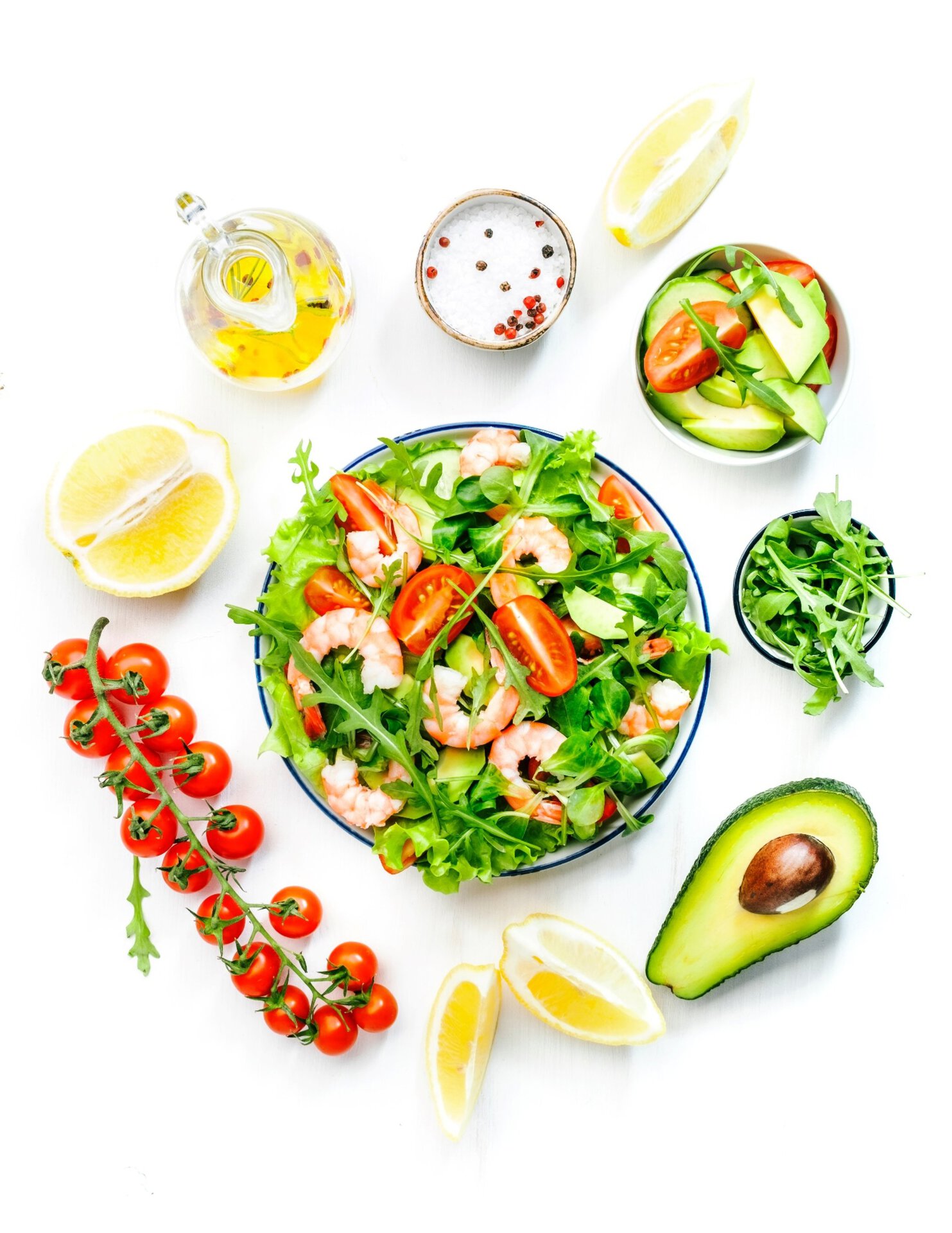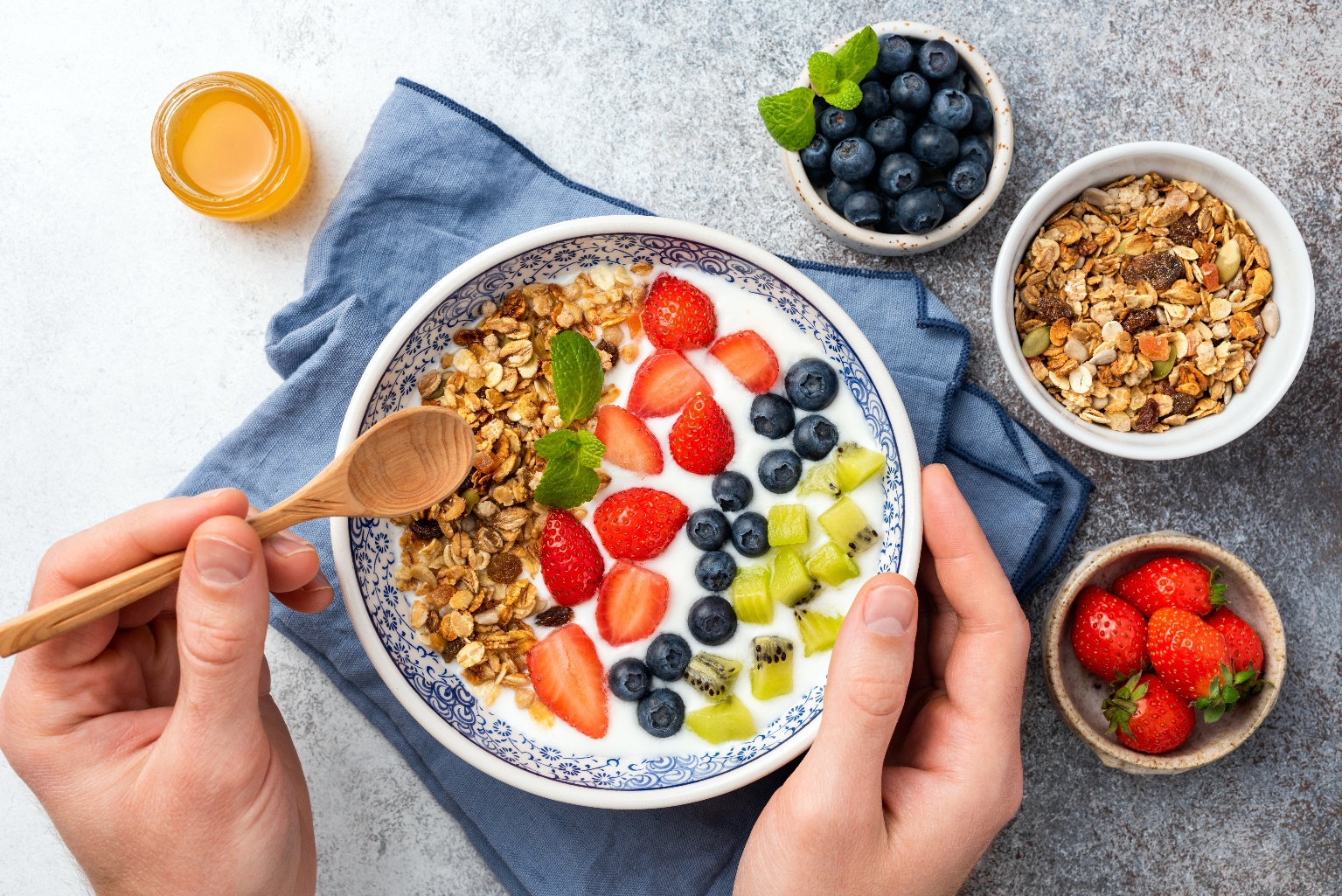The Ultimate
Clean Eating Cookbook
for Beginners
1000-Day Healthy Recipes and 4-Week Meal Plans to Help You Living Health
Janet Douglas
Contents
Introduction
What is Clean Eating?
8 Easy-to-Follow Guidelines to Help You Start Clean Eating and More Healthily
Food to Be Added in Clean Eating Diet
Foods to Be Avoided
Breakfast Recipes
Zucchini, Corn and Egg Casserole
Vegetable and Egg Scramble
Herbed Tomato Gratin
Breakfast Smoothie
Egg-Topped Quinoa Bowl with Kale
Fresh Herb Omelet
Omelet with Turmeric, Tomato, and Onions
Avocado Toast with Salsa
Poultry Recipes
Creamy Tuscan Chicken
Slow-Cooker Chicken
Chicken with Orzo Salad
Piri-Piri Chicken with Smashed Sweet Potatoes and Broccoli
Hummus-Crusted Chicken
Chicken, Avocado and Quinoa Bowls
Creamy Lemon Chicken
Chicken Cordon Bleu
Sweet and Sour Chicken
Asian Ginger Chicken
Shortcut Chicken Mole
Cilantro-Lime Chicken Bowls
Beef and Lamb Recipes
Herbed Lamb Chops with Greek Couscous Salad
Freekeh Tabbouleh with Spiced Lamb Kofta
Orzo with Lamb, Olives and Feta
Greek Lamb Meatballs
Lamb and Eggplant Ragu
Roast Leg of Lamb
Mint-Pesto Rubbed Leg of Lamb
Slow-Cooker Braised Beef with Carrots and Turnips
Beef Chili
Beef and Bean Chili
Pork Recipes
Pork Tenderloin
Prosciutto-Wrapped Pork with Roasted Apples and Fennel
Apricot-Espresso Glazed Roast Pork Loin
Ancho-Honey Pork Tenderloin
Irish Pork Roast with Roasted Root Vegetables
Tuscan Pork Loin
Seafood Recipes
Salmon Caesar Salad
Creamy Salmon
Shrimp-and-Grits-Stuffed Peppers
Greek Roasted Fish with Vegetables
Roasted Salmon with White Bean Ragout
Salmon with Asparagus and Mushrooms
Sizzling Salmon and Asparagus
Grilled Red Snapper
Grilled Snapper with Red Pepper Sauce
Grilled Lemon-Pepper Salmon in Foil
Cedar Plank Grilled Salmon
Ancho-Maple Barbecue Plank-Smoked Salmon
Soups and Salads Recipes
Chicken and Kale Soup
Spring Green Soup with Chicken
Kale and Avocado Salad with Blueberries and Edamame
Hand-Wilted Kale Salad
Kale, Carrot and Apple Salad
Green Machine Salad
Creamed Kale
Pumpkin and Black Bean Soup
Snacks and Sides Recipes
Green Juice
Carrot Cake Energy Bites
Ginger-Beet Juice
Mermaid Smoothie Bowl
Tomato-Vegetable Juice
Microwave Popcorn
Savory Date and Pistachio Bites
Crunchy Roasted Chickpeas
Vegetarian Recipes
Zucchini Lasagna Rolls
Veggie and Hummus Sandwich
Whole-Wheat Veggie Wrap
Broccoli Casserole
Cauliflower, Romanesco and Broccoli Gratin
Root Vegetable Gratin
Baked Falafel Sandwiches
Tomato and Basil Finger Sandwiches
Smashed Lemon-Garlic Zucchini with Parmesan
Blueberry-Lemon Ricotta Pound Cake
Pineapple Nice Cream
Pumpkin Pie Nice Cream
Banana Split Tarts
Cranberry-Hazelnut Tart
Brownie Raspberry Tart
Cinnamon Icebox Cookies
4 Weeks Meal Plans
Week 1
Week 2
Week 3
Week 4
Conclusion
Introduction
What is Clean Eating?
Clean eating has nothing to do with whether or not food is clean. It simply entails selecting minimally processed, whole foods that are high in nutrients. The concept is to eat foods as near to their natural condition as possible. Clean eating also includes choosing ethical and sustainable foods. The principles of eating clean urge you to eat more whole foods including fruits, vegetables, lean proteins, whole grains, and healthy fats while limiting overly processed snack meals, sweets, and other packaged foods.
8 Easy-to-Follow Guidelines to Help You Start Clean Eating and More Healthily
Consume More Fruits and Vegetables:
Fruits and vegetables are definitely healthful. They're high in fiber, vitamins, minerals, and plant chemicals, all of which assist to reduce inflammation and protect your cells from harm. In fact, a high fruit and vegetable intake has been linked to a lower risk of diseases including cancer and heart disease in several large observational studies. Fresh fruits and vegetables are great for clean eating since they may be eaten raw right after picking and washing. Organic fruits can help you go one step further with clean eating by decreasing pesticide exposure and perhaps improving your health.
Here are some simple methods to increase your intake of fruits and vegetables:
Include at least three different veggies in addition to greens in your salads to make them as colorful as possible.
Serve your favorite meals with berries, sliced apples, or orange slices.
Wash and cut the vegetables, then mix them with olive oil and herbs in a refrigerated container for quick access.
Limit Your Intake of Processed Foods:
Processed foods, which have been altered from their original condition, are in direct opposition to the clean eating lifestyle.
Most processed foods have lost some fiber and minerals while gaining sugar, chemicals, and other additives. Inflammation and an increased risk of heart disease have also been linked to processed meals.
Pay Attention to the Labeling:
Although clean eating emphasizes whole, fresh meals, certain packaged items, such as packaged vegetables, nuts, and meat, can be incorporated.
However, examine labels carefully to ensure that there are no preservatives, extra sugars, or harmful fats.
Many nuts, for example, are roasted in vegetable oil, which exposes them to heat damage.
Stop Consuming Refined Carbohydrates:
Refined carbohydrates are highly processed meals with minimal nutritional value that are easy to consume. Inflammation, insulin resistance, fatty liver, and obesity have all been related to refined carb intake in studies. Whole grains, on the other hand, which include more minerals and fiber, may help to decrease inflammation and improve intestinal health.
Vegetable Oils and Spreads Should Be Avoided:
Vegetable oils and margarines do not fulfill the clean eating requirements. For starters, they're made using a chemical extraction process, which means they're highly processed. Linoleic acid, an omega-6 fatty acid, is abundant in certain oils. It appears to promote inflammation in animals and isolated cells, thereby increasing your risk of weight gain and heart disease.
While artificial trans fats have been prohibited in the United States and other countries, tiny quantities may still be present in some margarines and spreads. Although all vegetable oils and spreads are discouraged in clean eating, it is vital to consume a modest quantity of good fats. Fatty fish, almonds, and avocado are just a few examples. If you can't totally eliminate vegetable oils, go for olive oil.




